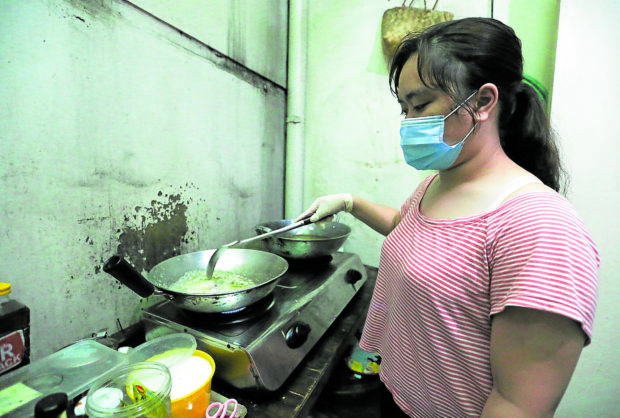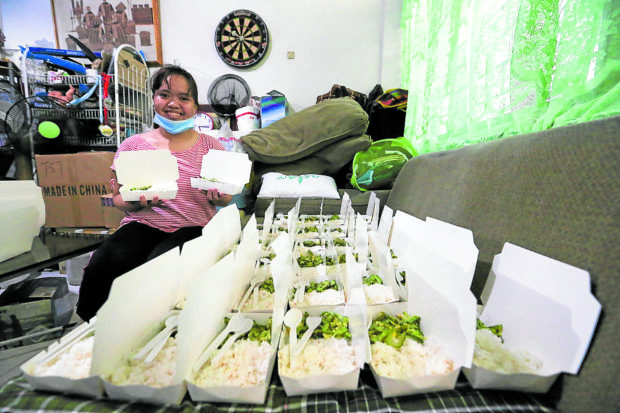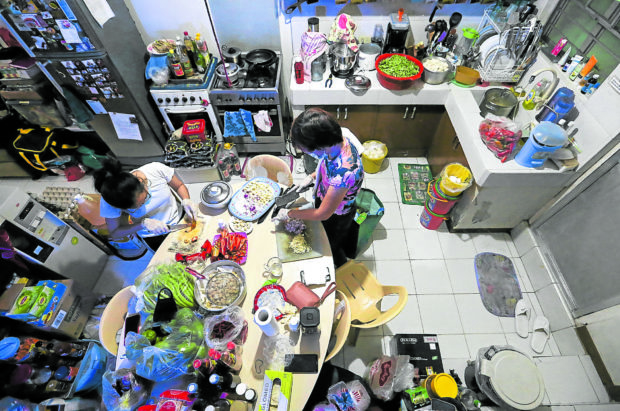From the kitchen, she helps front-liners keep up the fight

20-year old Jeannill Migaso cooking one of two viands that will be placed with rice into packed meals and delivered to health workers in UP-Philippine General Hospital in Manila. —LYN RILLON
Helping others at a time of crisis is no sweat for Jeanill Migraso, 20, who cooks one-dish meals for hospital front-liners in her family’s rented apartment in Cubao, Quezon City.
Like many other Filipinos, Migraso and her family have been housebound since the Luzon-wide enhanced community quarantine took effect on March 16. But unlike most, this daughter of full-time missionaries sought a way to help others in the fight against the coronavirus disease (COVID-19) pandemic.
How and where to be of aid began with a nudge in a Facebook group chat, with Paolo Macasaet, Migraso’s classmate in senior high school and now a student at the University of the Philippines (UP) Manila, asking for donations of medical supplies for UP-Philippine General Hospital (PGH). (Macasaet’s relative, Dr. Greg Macasaet, is among the front-liners who died in the course of treating those infected with the virus.)
Migraso felt she could contribute her time and skill. She knew how to cook, for one thing. At 10, she was joining grade-school cooking competitions and winning with her own recipes. She once took part in a local TV network’s edition of “Junior Master Chef” in 2011. She learned much about high-end cuisine but found that her interest lay in preparing more practical but no less nutritious meals.
She asked Macasaet if PGH health workers needed food donations, too. The response was quick: Yes, good for 200 people.
Article continues after this advertisementOn March 16, on her Facebook account, Migraso sounded a call for donations to fund packed meals for PGH front-liners. She tapped Alyssa Belda, her close friend and an interior design student, to make online posters for the project.
Article continues after this advertisement
20-year old Jeannill Migaso with some of the food packs for health workers in their family residence, a unit being rented in an apartment complex in Cubao, Quezon City. At least 100 ready-to-eat packed dinner meals will be picked up by a courier service van around 7 p.m. and delivered to frontliners in UP-Philippine General Hospital in Manila. The viand for the day is guisadong amplaya with egg and, in a next batch, sisig tofu. Since the food is still hot, Vitamin-C tablets (1 only) will be taped to the sides later before pick-up. —LYN RILLON
Worried parents
They managed to raise P16,000—mostly from students, teachers and family friends—within the day. As of Tuesday, the total has reached around P300,000.
Migraso’s parents, Leonilito, a mechanical engineer and retired account manager, and Mary Jean, a former private school teacher, said they hesitated when their youngest child asked permission to proceed with her mission. They were worried about the possibility of her contracting COVID-19, and the sheer amount of work needed to cook for large numbers of people.
“But we could not ignore her [desire to help],” the couple said. “We knew it would grow her faith.”
Migraso assured them she would be careful. When she came home from the market, it was straight to the bathroom for a change of clothes and disinfection for the family’s safety. Her parents, after all, are nearing senior age and, therefore, more vulnerable to the disease.
The first day of cooking was March 18, at Belda’s house in Barangay South Triangle, Quezon City. Migraso laughed at how they—herself, Belda and the latter’s two younger siblings, none of whom knew how to cook—produced 180 packed meals for dinner. She made them prepare the ingredients.
She recalled weeping over her aching arms.
Since then, cooking has been done at the Migraso apartment.
The team currently makes an average of 130 food packs daily for dinner, with 100 reserved for PGH. In each pack are rice, a vegetable-based dish, spoon and fork, and a vitamin C tablet in foil taped to it. When it is available, bottled water is included.
Daily schedule
Work starts in the early afternoon and ends when the food packs are picked up by the courier company Lalamove’s van around 7 p.m. for delivery. The recipients include not only doctors and nurses but also guards, interns and, sometimes, patients who are staying in the hospital premises but have nothing to eat.
Some packs are given to volunteers at checkpoints near the Migrasos’ area, to complement the food provided by the barangay.
In the beginning, the team prepared mostly meat-based ulam (dishes), until someone suggested that they consider Muslim front-liners, too. So the team shifted to mainly using vegetables, with chicken or canned tuna or egg as sahog (ingredient) or pampalasa (taste-enhancer).
“It’s healthy and cheaper,” Migraso said.
When the Inquirer visited, the family was chopping bitter gourd for guisadong ampalaya with egg. Belda, who had driven over, was dicing red bell peppers for another dish, sisig tofu. In the cramped back kitchen, Migraso, wearing a mask and latex gloves, was sautéing onions in a wok.
Since the project started, the family has had a total of three noncooking days. On those “rest” days, they ordered food from a restaurant using the donated funds and sent it by courier to PGH.

Alyssa Belda (left), a close friend of cooking enthusiast Jeannill Migaso, and the latter’s mother Mary Jean, preparing ingredients to be used in two different viands in the family dining room area that will be placed with rice into packed meals. These will delivered by courier service to frontliners in UP-Philippine General Hospital in Manila. —LYN RILLON
Transparency
Migraso is willing to help anyone who wants to start a donation drive. She can be reached through Frontliners’ Kitchen on Facebook. Statements on total donations (via GCash and a BDO account) and total expenses are posted in that Facebook account for transparency. There is also information on the funds’ other uses, such as the purchase of vitamin C as well as disinfectants made by the company of a friend’s mother, which are delivered straight to PGH.
Funds are also sent to a friend, Dr. Paul Alota, of Toledo General Hospital in Cebu province, who uses the money to buy snacks and groceries for the workers there.
For Migraso, all contributions count, big or small: “Lahat ng tulong malaki. If you give people the opportunity to help, they can find a way.”
She is thankful to her teammates, now seven, all close friends, who have pitched in. Also: “I am very grateful to all the donors who keep supporting us … Thanks to all the front-liners serving us in these trying times.”
A psychology freshman and full scholar at the Ateneo de Manila University, Migraso hopes to become a doctor specializing in neuropsychiatry.
To parents whose children are seeking ways to help those in need, her father said: “Support your children in their endeavors, [in their] being a person for others.”
For more news about the novel coronavirus click here.
What you need to know about Coronavirus.
For more information on COVID-19, call the DOH Hotline: (02) 86517800 local 1149/1150.
The Inquirer Foundation supports our healthcare frontliners and is still accepting cash donations to be deposited at Banco de Oro (BDO) current account #007960018860 or donate through PayMaya using this link.